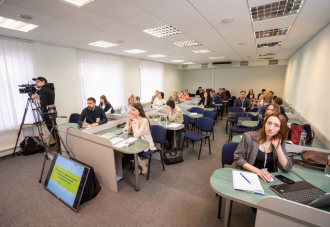The material is published on the Civic Space website
If you still think that the master layout plan of a city (village, territorial community) or the lack thereof has no effect on you whatsoever, then we have bad news for you. Community residents cannot build anything on new land plots, cannot get land plots to start a garden, entrepreneurs cannot get land plots to expand their business activities. And so the community development stops.
It is the master plan that regulates the rational definition of land use boundaries, areas of residential, public, industrial development, etc.
“At first I did not understand why the master plan is relevant for ordinary people,” says Denys Baranets (NGO Public Control Platform). — But Olesia Chavurska from NGO Information Human Rights Center “Edelweiss” explained that when there is no master plan, the boundaries of the community are unclear and nobody knows whether this or that piece of land is occupied or not. “And officials, in particular, receive a universal response not to register a land plot, and leverage to extort bribes.”
As part of Mentoring Program 2.0, mentee organization Information Human Rights Center “Edelweiss” undertook to address the lack of a master plan in the Prysyvaska Territorial Community
“Decentralization has given communities the rights and opportunities to make independent decisions for the benefit of their community. But at the same time, it resulted in opportunities and risks for various violations and abuses, provided that public control over decision-making processes and procedures is weakened,” said representatives Olesia Chavurska and Oksana Mykhailenko.
Mentor Denys Baranets shared his own experience on how to develop and implement an advocacy campaign that could help solve this problem.
Step by step on the way to the master plan
“Our meetings were long, thorough, with a detailed and step-by-step process of agreeing on actions and steps, reading instructions and legislation,” recall Olesia Chavurska and Oksana Mykhailenko.
At the time of start of the cooperation between the mentor and the mentee, the process of approving the master plan in the Prysyvaska Territorial Community had been going on for more than eight months. The first public hearings ended without any participants or results.
“IHRC “Edelweiss” team has agreed to work with the community to help the community overcome all obstacles – thanks to professional legal support and advocacy for the adoption of the master plan among residents and then among councillors,” said Denys Baranets.
Progression toward a goal:
- Holding public hearings with the participation of about 50 people (community residents, executive committee members) to create a master plan of the Prysyvaska Community;
- Preparation of 2-3 proposals to the master plan at public hearings, which should be taken into account by the authorities;
- Consideration of proposals by the relevant commissions, approval, amendments to the master plan.
“We were pleased that the communities selected for monitoring and cooperation adhered to these procedural points,” added IHRC “Edelweiss”. “We were able to join the process of developing master plans of the Prysyvaska Territorial Community (Kherson Region) and took part in public hearings, which were held in accordance with the procedure.” “As practice shows, it is a rarity to hold effective hearings where everyone is heard.”
As a result, on December 24, 2021, Prysyvaska Village Council of Kakhovka District (Kherson Region) adopted a decision on the approval of urban planning documentation – the master plan of Hryhorivka village.
A happy ending or just a motivating beginning?
“The key victory is holding real public hearings with 50 people and with real proposals from residents and their consideration by the community. After all, hearings are usually held for the sake of box-checking with the participation of only a few invited people and without taking into account the opinions and suggestions of the majority of residents,” said Denys Baranets.
According to him, it is necessary to motivate people not with money, not with the authority of the boss, but with the demonstration of real changes and results.
“We want to believe that the newly created communities will use those opportunities and the carte blanche given to them by their residents for the benefit of common development and prosperity,” hopes IHRC “Edelweiss”.
Indeed, what can better motivate reforms than tangible results in the lives of specific communities?
Mentoring Program 3.0 to strengthen the advocacy and other capacities of civil society organizations from different parts of Ukraine is part of the Project Ukraine Civil Society Sectoral Support Activity implemented by the Initiative Center to Support Social Action “Ednannia” in partnership with the Ukrainian Center for Independent Political Research (UCIPR) and Centre for Democracy and Rule of Law (CEDEM) with the sincere support of the American people through United States Agency for International Development.



